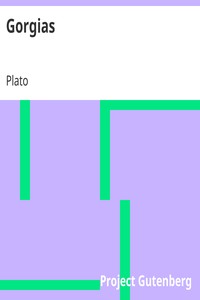Gorgias by Plato
"Gorgias" by Plato is a philosophical dialogue written in the late 5th century BC. This work explores complex themes such as the nature of rhetoric, the distinction between true knowledge and mere opinion, and the moral implications of justice and injustice. Central to the dialogue are prominent characters, including Socrates, Gorgias, a renowned rhetorician; Polus, his impetuous disciple; and Callicles, who embodies worldly ambition and a belief in might over right. The
opening of "Gorgias" sets the stage for a deep philosophical debate between Socrates and his interlocutors about the essence and purpose of rhetoric. Socrates aims to dissect Gorgias' claims about rhetoric as an art, questioning its legitimacy and contrasting it with true knowledge. Through a series of probing questions, Socrates challenges Gorgias' ability to define his own art coherently and later extends the debate to Polus and Callicles, revealing the limitations of their perspectives. The stage is set for a philosophical battleground where issues of morality, power, and the nature of the good life will unfold, emphasizing Socrates' relentless pursuit of truth and virtue over mere persuasive skill. (This is an automatically generated summary.)
Read or download for free
| How to read | Url | Size | |||
|---|---|---|---|---|---|
| Read now! | https://www.gutenberg.org/ebooks/1672.html.images | 364 kB | |||
| EPUB3 (E-readers incl. Send-to-Kindle) | https://www.gutenberg.org/ebooks/1672.epub3.images | 174 kB | |||
| EPUB (older E-readers) | https://www.gutenberg.org/ebooks/1672.epub.images | 178 kB | |||
| Kindle | https://www.gutenberg.org/ebooks/1672.kf8.images | 288 kB | |||
| older Kindles | https://www.gutenberg.org/ebooks/1672.kindle.images | 277 kB | |||
| Plain Text UTF-8 | https://www.gutenberg.org/ebooks/1672.txt.utf-8 | 348 kB | |||
| Download HTML (zip) | https://www.gutenberg.org/cache/epub/1672/pg1672-h.zip | 170 kB | |||
| There may be more files related to this item. | |||||
Similar Books
About this eBook
| Author | Plato, 428? BCE-348? BCE |
|---|---|
| Translator | Jowett, Benjamin, 1817-1893 |
| Title | Gorgias |
| Note | Socrates |
| Note | Wikipedia page about this book: https://en.wikipedia.org/wiki/Gorgias_(dialogue) |
| Credits | Sue Asscher |
| Reading Level | Reading ease score: 71.9 (7th grade). Fairly easy to read. |
| Language | English |
| LoC Class | B: Philosophy, Psychology, Religion |
| LoC Class | PA: Language and Literatures: Classical Languages and Literature |
| Subject | Classical literature |
| Subject | Political science -- Early works to 1800 |
| Subject | Ethics -- Early works to 1800 |
| Category | Text |
| EBook-No. | 1672 |
| Release Date | Mar 1, 1999 |
| Most Recently Updated | Apr 27, 2022 |
| Copyright Status | Public domain in the USA. |
| Downloads | 2149 downloads in the last 30 days. |
| Project Gutenberg eBooks are always free! | |

